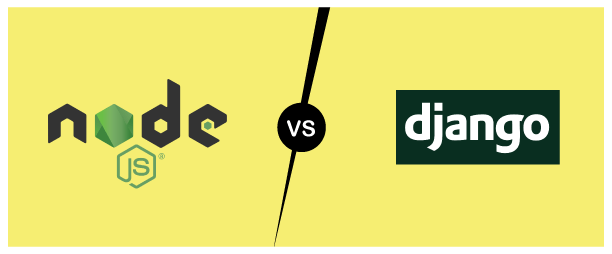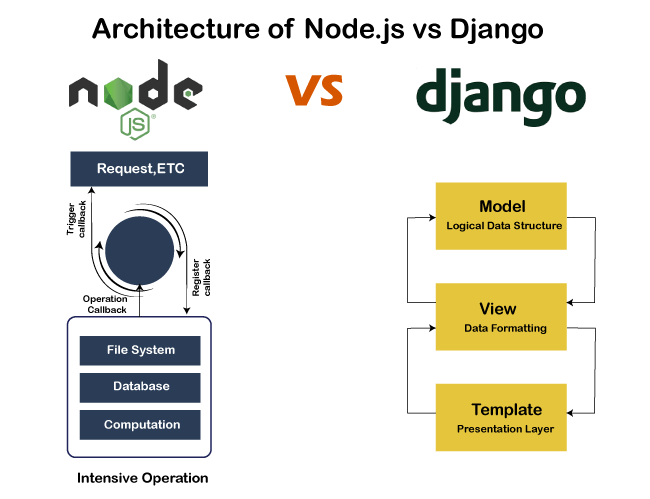Python Tutorial
Python OOPs
Python MySQL
Python MongoDB
Python SQLite
Python Questions
Plotly
Python Tkinter (GUI)
Python Web Blocker
Python MCQ
Related Tutorials
Python Programs
Django vs. Node JS | Difference between Django and Node JSIn this tutorial, we will discuss the primary difference between both trending technologies Django and Node JS. This tutorial will give you a deep analysis of both technologies that will help you select the appropriate language for projects or your career. We will explore all the essential topics as advantages, disadvantages, and their uses. 
Both technologies are much powerful in building the various purpose web-applications with an excellent user interface. Both are open-source, which means anyone can use them without any paid license. Let's have an overview of each technology which is given below. What is Django?Django is a high-level web framework that permits the user to develop secure and maintainable websites. It is written in the Python programming language. Experienced programmers build it. Django handles the hassle of Web development so that users can write efficient web-applications. It has a vast active community, excellent documentation, and other features. Features of DjangoDjango comes with the many useful features.
Django is based on the "Battery included" approach that allows the developer to do the things "out of the box." It provides almost every feature that works seamlessly together and follows a consistent design principle. If the user stuck while using it, he/she can take help from its up-to-date documentation.
Django is a versatile framework and used to develop multi-purpose or any web applications. One of the advantages is that it can easily collaborate with the client-side framework and bring content in almost any format.
Security is the main reason for the popularity of Django. It provides the best security to the web-application and avoids common security mistakes. It has been engineered to "do the right things" that automatically protects web applications. Django comes with a secure way to manage the password; it also avoids common mistakes such as putting session information in cookies where it is susceptible. Django protects the web-applications against many security issues such as SQL injection, cross-site scripting, and cross-site request forgetting and clickjacking.
The architecture of Django is independent of others and can be changed or replace easily if required. The different parts of Django have a clear separation that means it can increase traffic by adding hardware at any level.
Django encourages writing maintainable and reusable code. It follows the DRY (Don't Repeat Yourself) approach, so we will not get any unnecessary duplication. It promotes the grouping of related functionality into the reusable application. What is Node JS?Node JS is a server-side JavaScript platform; it is intended to build scalable network applications and was developed by Ryan Dahl in 2009. Node JS is a cross-platform runtime environment that is used for evolving server-side as well as networking applications. Node JS consists of a non-blocking and event-driven model that makes it lightweight and effective. Features of Node JSBelow are the few important features of Node JS.
Node JS's APIs are asynchronous and event-driven, which means a Node JS bases server doesn't need to wait for an API to return data. A notification mechanism informs the server that the previous API generates a response while working on the new API.
The Node.JS library provides the superfast speed to execute the code as it is built upon Google Chrome's V8 JavaScript engine.
Node.JS is highly scalable because it uses a single-threaded model with event looping. Its event mechanism allows the server to respond in a non-blocking way where the traditional servers create limited threads to handle requests. It makes Node.JS highly scalable. The Node.JS single thread program can provide the service to a large number compared to traditional servers such as Apache HTTP.
Node.JS application doesn't buffer while processing the data. These applications process the output data in portions. Difference between Django and Node.JS
Architectures of Node JS and Django
DjangoDjango follows the MVT (Model View Template) architecture. It provides several advantages over the many old frameworks. It helps the developer to build apps faster and advanced. Its component-based pattern helps in ease modification. One change in a component does not affect the whole application or another component. Node JSNode JS architecture is quite dissimilar to the other server-side platforms. It is based on the even loop architecture and single-threaded that helps to build high-end applications. The advantage of single-threaded is that there is no context switching between that helps to reduce reloads. In Node JS, handling multiple concurrent requests is easy and very fast. It provides robustness to the application and making them available for processing requests without delay. Advantages and Disadvantages of DjangoBelow are the few important pros and cons of Django. Advantages
Disadvantages
Advantages and Disadvantages of Node JSBelow are a few important pros and cons of Node JS. Advantages
ConclusionIn this tutorial, we have learned the difference between two leading web technologies - Node JS and Django. Moreover, we have also discussed the various aspects of both technologies. Both technologies are suitable to build large-scale web applications or web apps. Before choosing anyone from them, we need to understand our requirements. Django is much secure where it maintains passwords effectively and Node JS provides many libraries, which helps the developer create highly flexible web apps. There is no specific answer to the question, "Which technology is much better?" All we need to understand the project requirements then should move to the most appropriate technology.
Next TopicPython Frameworks
|
 For Videos Join Our Youtube Channel: Join Now
For Videos Join Our Youtube Channel: Join Now
Feedback
- Send your Feedback to [email protected]
Help Others, Please Share










